
A digital rendering of Muon Space's Halo satellite. Muon Space image
Muon Space closes Series B round at $146M
The four-year-old small satellite maker has more financial resources for the development of its Earth intelligence gathering platform and to acquire another company.
Muon Space, a small satellite manufacturing startup, has closed its Series B capital raise at $146 million to support the scaling of its production posture and acquire a fellow young company that specializes in propulsion technology.
That dollar figure includes an initial $56.7 million capture announced in the summer of 2024, which was followed by a $89.5 million extension Muon revealed Friday.
Founded in 2021, Muon is headquartered in Silicon Valley and designs its low-Earth orbit satellites to collect and distribute Earth intelligence data for government and commercial operators.
Muon secured a second-stage contract with the National Reconnaissance Office in May to help fund the further development and eventual deployment of the Halo satellite platform.
The new capital will go toward the expansion of satellite production and staff size, further vertical integration of components such as propulsion and infrared/radio frequency instruments, deployment of an automated operations tool and continued buildout of a ground station network.
“We’re focused on delivering mission-optimized satellite constellation systems to customers at unprecedented speed,” Muon’s chief executive Jonny Dyer said in a release. “High-performance constellations require the speed, cost, consistency, and performance of volume production — they can’t be built one satellite at a time.
Muon is also contracted to provide satellites for Vindler, a commercial RF sensing constellation being built by Sierra Nevada Corp.
Muon’s primary manufacturing hub is a 130,000-square-foot facility in San Jose, California that is intended to handle the production of 500 satellites per year.
In addition to internal scaling efforts, Muon is also using the newfound capital for its acquisition of propulsion startup Starlight Engines to incorporate this company’s solid propellant thruster system.
Starlight developed those systems to be fueled by zinc as an alternative to traditional propulsion methods involving high-pressure fluids.
Phase one of the Series B round was led by Activate Capital with participation from Acme Capital, Costanoa Ventures, Radical Ventures and Congruent Ventures. The second phase was led by Congruent Ventures with participation from Activate Capital, Acme Capital, ArcTern Ventures, Costanoa Ventures and Radical Ventures.
NEXT STORY: US Air Force’s nascent radar plane faces the axe

